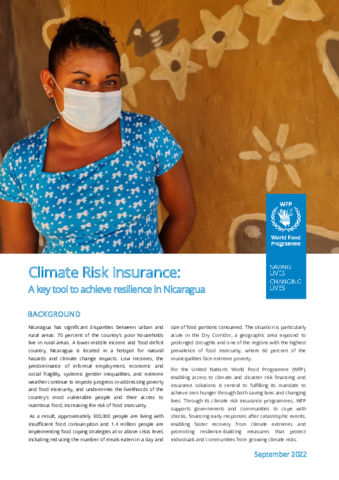
Nicaragua is located in a hotspot for natural hazards and climate change impacts. Low incomes, the predominance of informal employment, economic and social fragility, systemic gender inequalities, and extreme weather continue to impede progress in addressing poverty and food insecurity. To build the resilience of climate vulnerable communities, WFP Nicaragua piloted a microinsurance programme in 2021, providing protective coverage to nearly 2,200 people. The microinsurance scheme entered the scale-up phase in 2022, which aims to protect 5,000 people with insurance. This factsheet presents the implementation of the pilot phase, the 2022 scale up strategy, a beneficiary story and lessons learned, as well as WFP Nicaragua macro-level financial protection approach.
